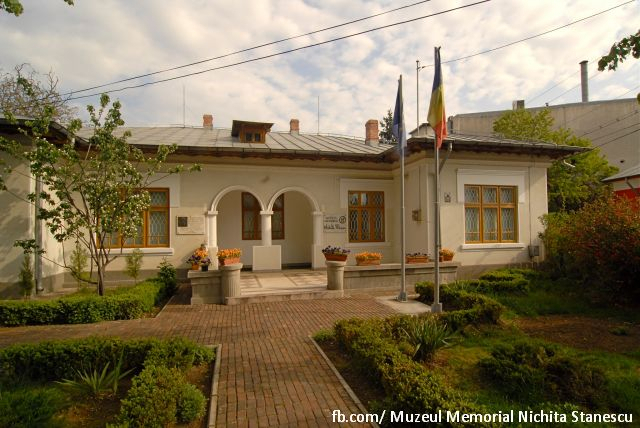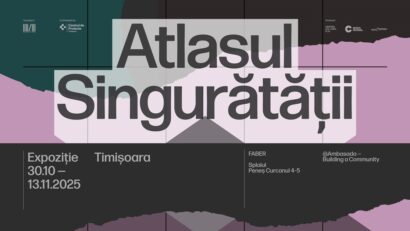The Nichita Stanescu Memorial Museum in Ploiesti
This is the childhood home of the poet considered the greatest in the modern era

Ion Puican, 24.04.2021, 13:41
In
Ploiesti, a city 60 km north of Bucharest, you can find a small
hidden away street with a courtyard full of blooming trees, with an
elegant house typical of the area. This is the memorial house
dedicated to Nichita Stanescu, the poet said by the critics to be the
greatest Romanian poet of the modern era. We went to this house,
where the poet grew up, accompanied by the curator of the museum,
Ioana Rosu. She shared with us a few thoughts about the museum and
the poet it is dedicated to, Nichita Stanescu, who lived between 1933
and 1983. She told us about the significance of the place for the
locals and for all Romanians:
I
want to recall and prove that our city, famous for its crude oil
production, has also provided many people of value, such as
playwright Ion Luca Caragiale, actor Toma Caragiu, and poet Nichita
Stanescu. The latter has been promoted heavily since 1986, when the
poetry festivals named after him were started. They take place every
year on March 31, the date of his birth. This happened up until the
year 2000, when we recovered the Stanescu family house, and we could
start the process of bringing him back home. This is the home of his
birth. We were incredibly lucky back then to have his sister,
Mariana, to guide us and advise us in restoring the house the way it
was when the poet was growing up.
We
continued our incursion into Nichita Stanescu’s life going through
the museum and its exhibits, with stories about his childhood. Ioana
Rosu led us through it:
We
have here a few manuscripts, with biographical data, photos,
diplomas, but this is mostly his childhood home. In his bedroom we
have on top of his bed a teddy bear, which was dear to him when he
was a kid. We also have his writing desk when he was in school, and
the upright piano he played when he got back from school. We have a
lot of the family’s belongings, which were given back to be seen
here. The keeper of most objects was his sister Mariana, since he
lived most of his life in Bucharest, even though he was never
officially a resident of the city. He spent his youth there. The most
valuable are the books with dedications, autographs, the prizes. I
would mention the two most important prizes, because the Writer Union
gave him awards for every single volume of poetry. His highest
achievements, though, were the 1976 Herder Award, which he got in
Vienna in 1976, for his volume Elegies, and the 1982 Struga Poetry
Evenings Award, which he got in what is now North Macedonia, a
beautiful golden wreath that is now displayed in a glass case, the
main attraction for visitors. Many a poet has coveted this prize, but
Nichita actually got it. He grew up with a nanny, Ana Silaghi, who
raised and educated him. He was getting piano lessons at home,
starting from the age of 6. His mother, Tatiana, noticed he had an
ear for music. In a radio interview, sometime in 1975, she said that
if he hadn’t been a poet, he probably would have been a great
musician. He had everything he needed, in addition to his mother’s
support. Tatiana Stanescu said that he wrote his first poem when he
was in kindergarten. One autumn day, she recalled, she was cooking in
the courtyard, and she heard him babbling something, and asked him
what he was saying. He recited the poem to her, and she went in the
house to jot it down. She showed it to him when he was older, it was
a poem with a pace and rhyme, written by a preschooler. He was a
feisty kid, a true Aries, a fire sign. In school, his math teacher
said that he was writing epigrams in class, and so he didn’t push him
much in that subject matter, even though many of his poems feature
mathematics, such as The Lesson About The Cube, The Lesson About the
Circle, or Geometry, which some say is a mathematical poem. He had a
great childhood, but also a bad period. He lived through the
bombings, the Americans were bombing the city of Ploiesti and the oil
refineries there, so the Stanescu family locked up their home and
fled. Luckily for them, the house was untouched by the bombs, but the
child wasn’t, some images stuck with him, because in his poetry we
often find images of soldiers, or of burning trees. These things were
imprinted in his memory.
For
the end of our visit to the quaint and beautiful memorial house,
Ioana Rosu told us her impression of the place:
I
am trying to tell people that this is a welcoming place, and many
cross its threshold with the feeling that Nichita is close by, that
he could even be their host. He lived to the fullest, he was a torch
burning bright. He passed away too quickly, but Nichita lived in 50
years what others wouldn’t in 150 years, and that is all that
matters.






























